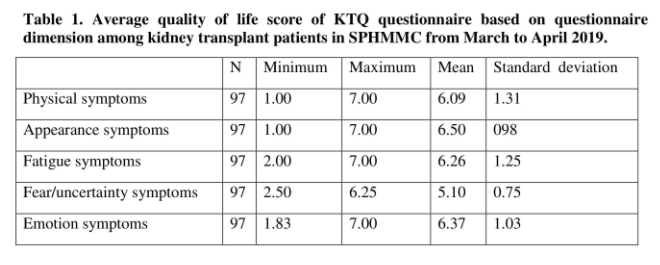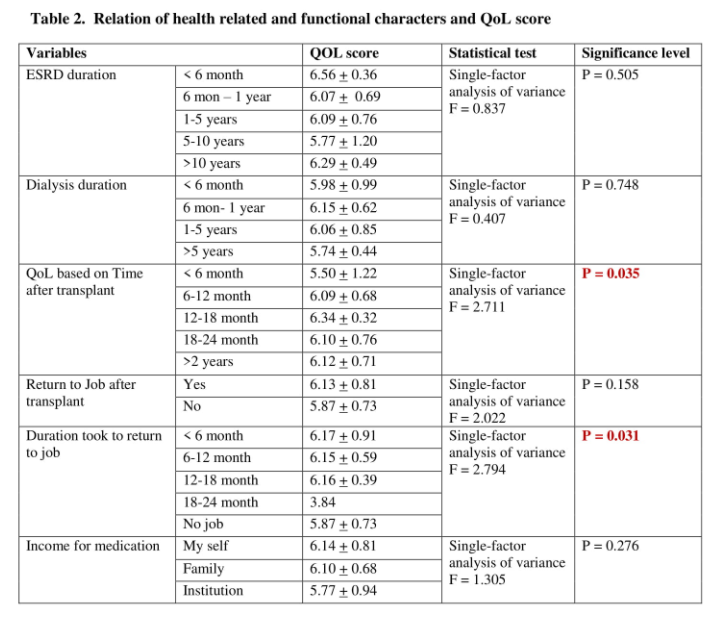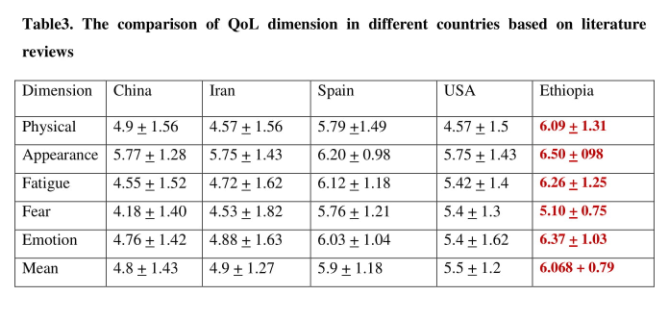Quality of life and associated factors of kidney transplant patients in Ethiopia
Mekdim Siyoum1, Mahteme Muleta1, Tekleberhan Gebretsadik1, Engida Gelan1, Tsion Ketema1, Tesfalem Teshome2, Kenneth Woodside3, Alan Leichtman4, Jeffery Punch3.
1Surgery, Saint Paul Hospital Millennium Medical College, Addis Ababa, Ethiopia; 2Public Health, Saint Paul Hospital Millennium Medical College, Addis Ababa, Ethiopia; 3Surgery, University of Michigan, Ann Arbor, MI, United States; 4Nephrology, University of Michigan, Ann Arbor, MI, United States
Introduction: Kidney transplantation (KT) is the preferred rerplacement treatment for patients with chronic kidney disease (CKD). It provides better quality of life (QoL) besides many other benefits. World Health Organization defines QoL as an individual’s awareness of their position in life in the context of the culture and value systems in which they live and relate to their goals, hopes, standards and concerns. Several studies on QoL of patients who had KT are done using standardized qualitative and quantitative methodologies around the world. We haven’t come across publication on QoL after KT from Africa. This study was done to determine the quality of life and associated factors of kidney transplant patients in Ethiopia, Eastern Africa.
Methodology: The study was conducted at Ethiopian Ministry Health's National kidney transplant center located at Saint Paul Hospital Millennium Medical College, Addis Ababa Ethiopia. It was an institution-based cross-sectional study design. A validated questionnaire KTQ-25 was used for data collection on 97 kidney transplant patients . The study was conducted from Jan 28, 2019 to April 5, 2019. Descriptive analyses of demographic and QoL variables were conducted. Also demographic and patient characteristic variables included in and bivariate analyses were conducted using student t-test and one way analysis of variance or ANOVA were used to determine relationships between demographics, and QoL.
Results and Discussion: The mean of QoL in this study was 6.06 ∓ 0.79, the maximum score was obtained in appearance dimension and the minimum score was obtained in fear dimension. In comparing the quality of life scores based on the socio-demographic factors, no statistically significant difference was observed. In comparing the quality of life scores based on health-related and functional characters a statistical difference was observed between the quality of life score based on the time after transplant (p=0.035) and the duration returning to their job after transplant (p=0.031). P-value < 0.05 is considered as statistical significance. Published studies couldn’t be found about quality of life in kidney transplant patients as many worldwide and couldn’t come across with such studies in Africa. Despite this fact QoL in Ethiopia is good measuring a mean score of 6.068 + 0.79 which is higher than that of Rebollo in Spain (5.9 ∓1.18), Oveilly study in US (4.5 ∓1.2), Iran (4.9 ∓1.27) and Chinese (4.8 ∓1.43) which has been reported with the same questionnaire.
Conclusions: Even though Kidney transplantation was started only four years back, Ethiopian kidney transplant patients’ quality of life level is better. Time after transplant and the duration to return to their job after transplant has a statistically significant association with quality of life. Having a counseling session for those who score low in quality of life domains is recommended.
Keywords: quality of life, kidney transplantation, associated factors



Saint Paul Hospital Millennium Medical College. Ethiopian Health Ministry.
[1] Wyld M, Morton RL, Hayen A, Howard K, Webster AC. A systematic review and meta analysis of utility based quality of life in chronic kidney disease treatments. PLoS Med 2012;9(9):e1001307.
[2] Laupacis A, Pus N, Muirhead N, Wong C, Ferguson B, Keown P. Disease specific questionnaire for patients with a renal transplant. Nephron. 1993;64(2):226–231
[3] World Health Organization. (1997). Measuring Quality of Life. Retrieved 2017 May 05 from http://www.who.int/mental_health/media/68.pdf
[4] Weng, L.C., Dai, Y.T., Huang, H.L., & Chiang, Y.J. (2010). Self-efficacy, self-care behaviors and quality of life of kidney transplant recipients. Journal Of Advanced Nursing. 66, (4), 828-838.
[5] Kostro, J. Z., Hellmann, A., Kobiela, J., Skóra, I., Niemierko, M.L., Slizien, A.D., & Sledzinski, Z. (2016). Quality of Life After Kidney Transplantation: A Prospective Study. Transplantation Proceedings, 48, (1), 50-54.
[6] Terada, I., & Hyde, C. The SF-36: an instrument for measuring quality of life in ESRD patients. Journal of Renal Care. 28, (2), 73-76
[7] Beauger D, Gentile S, Jouve E, et al. Analysis, evaluation and adaptation of the ReTransQoL: a specific quality of life questionnaire for renal transplant recipients. Health Qual Life Outcomes. 2013;11(1):1–11.
[8] Rostami, Z., Tavallaii, S.A., Jahani, Y., & Einollahi, B. Assessment of quality of life in a single-center transplantation population using the Kidney Transplant Questionnaire-25 questionnaire. Transplantation Proceedings .43, (2), 590-591.
[9] Maglakelidze N, Pantsulaia T, Tchokhonelidze I, Managadze L, Chkhotua A. Assessment of health related quality of life in renal transplant recipients and dialysis patients. Transplant Proc.2011;43(1):376–379.
[10] Tayebi A.1 MSc, Raiesifar A. MSc, Ebadi A.1 PhD, Eynollahi B.2 MD, Rafiyan Z.1 MSc, Keyvanloo F.1 MSc. Investigation of renal transplantation patients’ quality of life by kidney transplantation questionnaire (KTQ-25). Faculty of Nursing, Baqiyatallah University of Medical Sciences, Tehran, Iran.
[11] Yujian Niu1, Wenxin Zhang, Sha Mao, Yanhong Gao, Jianli Wang, Jun Li, Letian Wang, Zhaojie Guan, Zhongyang Shen. Pilot feasibility research of Chinese version of kidney transplant questionnaire in recipients of living donor kidney transplantation 1Institute of Organ Transplantation, The General Hospital of Chinese People’s Armed Police Forces, Beijing 100039, China; December 30, 2015
[12] Couser WG, Remuzzi G, Mendis S, Tonelli M. The contribution of chronic kidney disease to the global burden of major no communicable diseases. Kidney Int. Dec 2011; 80(12):1258-1270.
[13] Jha V, Garcia-Garcia G, Iseki K, et al. Chronic kidney disease: global dimension and perspectives. Lancet. Jul 20 2013; 382(9888):260-272.
[14] World Kidney Day: Chronic Kidney Disease. 2015; http://www.worldkidneyday.org/faqs/chronic-kidney-disease.
[15] Janaudis Ferreira Tania, Sapir-pichhadze Ruth, Nzula Sazini, Fiore Julio, Mayo Nancy 2018. Identifying what aspects of the post kidney transplant experience affect quality of life. July 2018 – volume 102 – issue – p S530.
[16] Wei, T. Y., Chiang, Y. J., Hsieh, C. Y., Weng, L.C., Lin, S. C., & Lin, M. H. (2013). Health Related Quality of Life of Long-Term Kidney Transplantation Recipients. Biomedical Journal. 36, (5), 243-251.
[17] Zheng, X.Y., Han, S., Wang, L.M., Zhu, Y.H., Zeng, L., & Zhou, M.S. (2014). Quality of Life and Psychology After Living-related Kidney Transplantation from Donors and Recipients in China. Transplantation Proceedings. 46, (10), 3426-3430.
[18] Tayyebi, A., Raiesifar, A., Najafi, M. S., Ebadi, A., Einolahi, B., & Pashandi, S. (2012). Measuring health related quality of life (HRQOL) in renal transplant patients: psychometric properties and cross-cultural adaptation of kidney transplant questionnaire (ktq-25) in Persian. Nephro-Urology Monthly, 4, (4), 617-621,
[19] Momina M. Ahmed, Mahteme Bekele, Engida Abebe, Mekdim Tadesse, Tekleberhan Berhe, BerhanuWorku, Berhane Redae, Zerihun Abebe, Fasika Tedla, Mersema Abate, Deepa Jayaram, Jose Medina Pestana, Lynn Reid, Colleen Satarino, Carly Fritsch, Lia Gebremedhin, SenaitFisseha, Robert Merion, Kenneth Woodside, Alan Leichtman, Jeffrey Punch. Live Donor Kidney Transplantation Outcomes Following Establishment of the First Kidney Transplant Center in Ethiopia. 2017.
[20] Bohlke M, Marini SS, Rocha M, et al. Factors associated with health‐related quality of life after successful kidney transplantation: a population based study. Qual Life Res. 2009;18(9):1185–1193.
[21] Rebollo P, Ortega F, Ortega T, et al. Spanish validation of the “Kidney Transplant Questionnaire”: a useful instrument for assessing health related quality of life in kidney transplant patients. Health Qual Life Outcomes. 2003;1(1):10351039.
[22] Haller M, Gutjahr G, Kramar R, Harnoncourt F, Oberbauer R. Cost effectiveness analysis of renal replacement therapy in Austria. Nephrol Dial Transplant. 2011;26(9):29882995.
There are no comments yet...